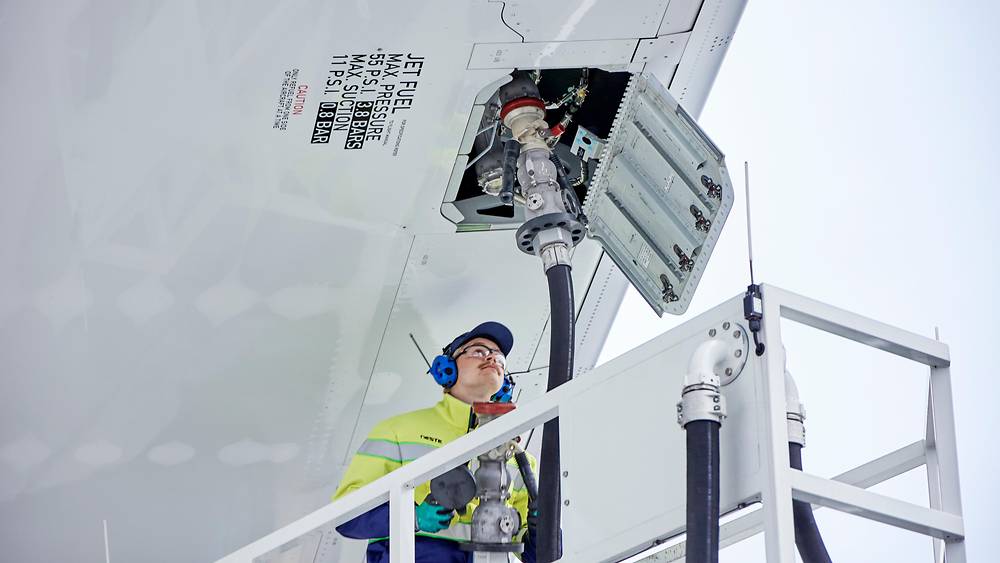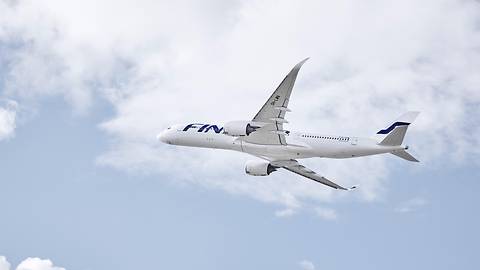Environmental sustainability


Pursuing progress over perfection
Aviation accounts for around 2.5% of global carbon dioxide (CO₂) emissions. In addition to CO₂, flying generates other emissions that contribute to global warming, especially at high altitudes.
Unlike many other sectors, aviation has few low-emission alternatives. Today, over 99% of jet fuel used globally is still fossil-based, sustainable fuels are only beginning to scale, and the time of hydrogen and electric aircraft are further in the future.
While there is no quick solution to reducing emissions from flying on a large scale, we can take action today – and we welcome your participation in this effort.
On this page, we present our main actions to reduce emissions, manage materials responsibly and protect biodiversity. To find out how you can participate in reducing emissions from flying, we have put together tips for holiday travellers and launched a Finnair for Business SAF Service for corporate customers. We also offer an option to purchase SAF while booking flights. In the first year following the launch of this service in November 2024, around 71,000 customers had chosen this option.
Fossil carbon emissions
Reducing fossil carbon emissions is the greatest challenge facing aviation today. We are committed to reducing CO₂ emissions through concrete, forward-looking actions.
Our key actions for future CO₂ reduction
- We are committed to increasing the use of sustainable aviation fuel (SAF), which is an alternative to fossil jet fuel. In 2024, around 0.5% of the fuel we used was biogenic SAF that meets strict sustainability standards as defined in the ReFuelEU Aviation Regulation. In 2025, we expect the share of SAF to rise to around 1.5%. This includes the mandated SAF, contributions from customers and voluntary SAF purchases funded by Finnair and our corporate partners. As we fuel our aircraft also outside the EU, the percentage reflects the share of SAF in relation to our global fuel consumption.
- We aim to drive SAF availability by:
- Empowering our customers to increase SAF usage by making a contribution while booking flights or through the Finnair for Business SAF service
- Scaling up Finnair’s own voluntary SAF volumes beyond the mandatory amounts
- Investing in future technologies
- Partnering with innovators and other stakeholders to produce eSAF from CO₂ and renewable hydrogen
- Supporting SAF ecosystem development
- As an example, we are participating in a globally unique demonstration project, led by Liquid Sun, to produce renewable, sustainable aviation fuel (eSAF) from biogenic CO2 emissions.
- We continue to invest in fuel efficiency every day with every single flight. This means fuel-efficient flight planning, reducing the operative weight of the aircraft and operating each flight as fuel-efficiently as possible.
- We support research that helps accelerate the development of new technological solutions, such as sustainable aviation fuels, electric, hydrogen and hybrid flying.
- We purchase emission allowances under the EU ETS to cover our verified CO₂ emissions. Revenues from allowance auctions go to EU Member States, which are partly required by the ETS Directive to allocate at least half of this income to climate action and the energy transition. In March 2025, Finnair applied for SAF-based ETS allowances to help offset part of the additional costs of using sustainable aviation fuel (SAF) instead of conventional jet fuel in 2024. That year, Finnair consumed 4,685 metric tonnes (MT) of SAF, of which 769.47 MT were linked to flight routes within the EU ETS scope. In September 2025, Finnair was awarded 6,810 SAF allowances.
Sustainable aviation fuel explained
As the pressure to decarbonise aviation grows, SAF has emerged as a key technology driver for reducing emissions, especially for long-haul flying.
SAF is an alternative to conventional aviation fuels. It has the potential to reduce our industry’s reliance on fossil fuels. While SAF emits similar CO₂ levels during combustion, its lifecycle fossil carbon (CO₂) impact is significantly lower, even 80 % lower than that of fossil jet fuel, as it is produced from non-fossil resources. However, due to its limited availability, the overall impact on the entire sector’s footprint remains small for the moment, but its usage is a positive step forward.
In the coming years, the share of SAF will increase both through regulation and through our voluntary actions. As of 2025, the EU has required that fuel providers mix on average 2% of SAF for flights departing from the Union airports in-scope of ReFuelEU Aviation. In addition to these mandated SAF volumes, we will need to increase the voluntary SAF volumes in order to meet our climate targets.
EU grants Sustainable Aviation Fuel (SAF) allowances for commercial aircraft operators that utilise SAF on routes eligible within the EU ETS. The mechanism support airlines in their transition to more sustainable aviation by mitigating the cost disparity between conventional kerosene and SAF. These allowances provide financial relief by offsetting a portion of the additional costs associated with the use of SAF in place of conventional Jet Fuel, thereby supporting the airline’s ongoing commitment to sustainable aviation and carbon emissions reduction.
There are multiple roadmaps published outlining similar results needed to achieve carbon-neutral flying (IATA Waypoint 2050, A4E destination 2050, WEF SAF as a Pathway to net-zero Aviation and oneworld Path to net-zero Emissions). We need to pull many levers, but the most important one requiring our focus now is sustainable aviation fuel.
Benefits of SAF
- Sustainable aviation fuel can be blended with conventional jet fuel and safely used in existing aircraft without modifications to engines or infrastructure.
- Sustainable aviation fuel is estimated to be the key technology driver for reducing flying emissions, especially for long-haul flying.
- While SAF emits similar CO₂ levels during combustion, its lifecycle fossil carbon emission impact is at least 65% smaller than fossil-based kerosene because it is produced from non-fossil resources, such as used cooking oil.
- While the carbon emission reduction from SAF use is limited on a single flight, its integration into the airport’s fuel system helps reduce aviation’s overall environmental impact.
Non-CO₂ emissions
When we talk about aviation and global warming, we often only think about carbon dioxide emissions. However, the reality is more complicated. In addition to carbon dioxide, there are other greenhouse gases, and in aviation, water vapour has a special effect. Ice crystal clouds, contrails, have a significant impact on global warming high in the atmosphere by reflecting Earth's thermal radiation back to the Earth at night. The warming effect of these contrails can be influenced by changing flight paths and using aviation fuel that burns more cleanly.
Finnair takes this challenge seriously. From 2025, European regulations require airlines to monitor and report the climate impacts of non-CO₂ emissions. In 2025, Finnair has set itself the goal of developing a systematic approach to the optimisation of contrails while taking into account fuel consumption, safety and cost-effectiveness.
Our key actions to reduce non-CO₂ emissions
- Monitoring and reporting: We use the EU's NEATS system for reporting and calculating non-CO₂ emissions, through which the impact of emissions can be reported transparently in accordance with regulatory requirements. The first reporting and calculation will take place in the first half of 2026, after which Finnair will have verified information on the climate impacts of non-CO₂ emissions for the first time.
- Contrail avoidance: We test and expand our capabilities to automatically avoid long-living contrails. This still requires a strong contribution from software developers to get functional capabilities for the current flight planning and optimisation software on the market.
- Innovation and partnerships: We collaborate with leading climate technology partners to develop smarter solutions for flight planning and emission control.
- Continuous improvement: We collect and analyse data and feedback to refine our approach and maximise climate benefits.
Circular economy
The food and materials consumed on flights also impact our environmental footprint. We have set a company-wide target of 100% material management. This circular economy implementation objective focuses on the materials of the industrial sectors listed below that use the most resources and where the potential for circularity is high.
Although some waste streams can’t be recycled or used for biogas production due to regulations, we ensure that all in-flight waste ending at our Helsinki hub is repurposed – as energy, heat, biogas, manure or material. Nothing goes to landfill.
Our key actions for more sustainable material management
- We include the circular economy design principles in all operations.
- We focus on reducing waste and strive to turn waste streams into material streams for use in other industries.
- Plastics:
- substituting single-use plastics,
- recycling,
- paying attention also to biobased and biodegradable plastics.
- Food:
- improving order-delivery-based service,
- striving to reduce food waste onboard by offering more pre-order choices,
- donating excess meals to charity.
- Packaging:
- reducing packaging materials and single-use packaging products,
- donating excess amenity kits to charity.
- Textiles and fibres: improving textile reuse and recycling.
- Electronics and ICT: improving the sorting of electronic waste.
- Batteries and vehicles: enhancing the circular potential of batteries.
- Construction and buildings: promoting circularity principles in facility management.
- Plastics:
Biodiversity
Biodiversity is essential to human well-being and the beauty of our planet. Protecting land and oceans requires sustainable consumption, responsible production and nature conservation.
We’re committed to using only sustainable aviation fuel (SAF) that meets the sustainability criteria of EU’s Renewable Energy Directive (RED II) and/or CORSIA (Carbon Offsetting and Reduction Scheme for International Aviation). This ensures that the growing demand for SAF is met responsibly — with attention to climate, biodiversity, and Indirect Land Use Change (ILUC). ILUC helps prevent farmland used for food from being diverted to biofuel production, which could lead to deforestation, wetland loss or reduced food supply.
Unfortunately, air transport is sometimes exploited for smuggling illegal flora and fauna — with the illegal wildlife trade estimated at over $19 billion annually.
As a signatory to the Buckingham Palace Declaration (United For Wildlife’s Transport Task Force), Finnair is committed to raising awareness of this issue. Finnair is also an IATA IWT registered airline.
Our key actions in biodiversity conservation
- Ensure that our growing demand for SAF is met responsibly.
- Raise public and personnel awareness of the illegal wildlife trade.
- Provide proper training for employees who may encounter illegal wildlife trade.
- Finnair has placed an embargo concerning hunting trophies, including their skin/hide and all articles made from or containing parts of such animals.
- Finnair doesn’t tolerate suppliers, customers and personnel involved in these crimes and we encourage all our partners and personnel to follow the same principle.

